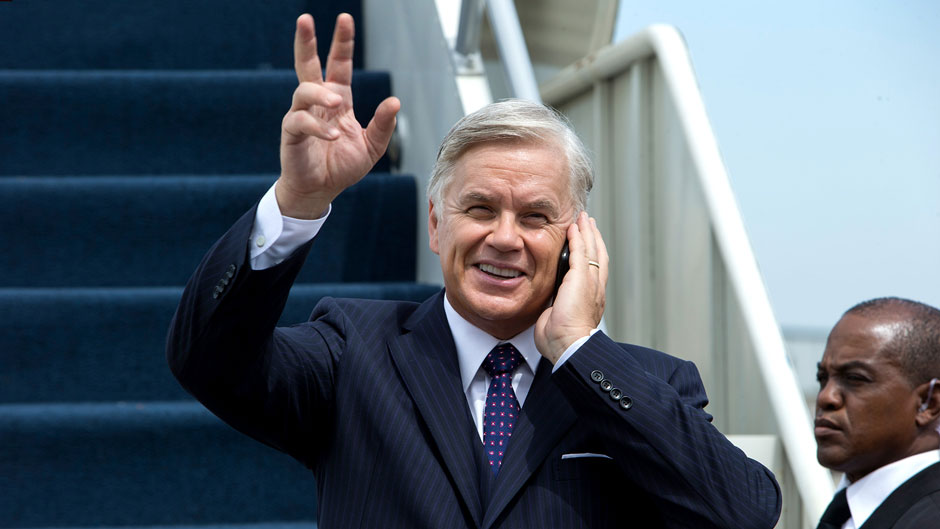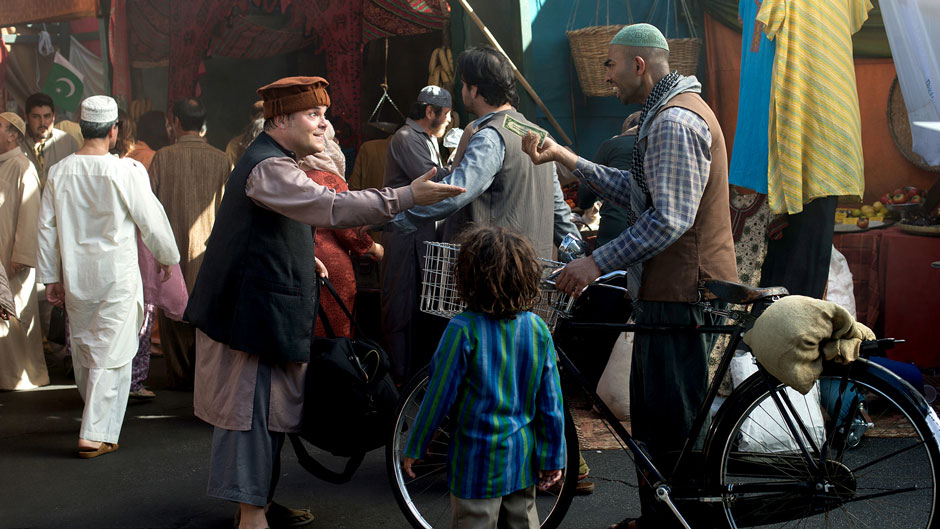What if the only two people with the will and the power to prevent World War III were a rogue secretary of state—a hard-drinking, compulsive womanizer—and a low-level State Department functionary who spends his time scoring weed, pursuing unattainable women, and dreaming of a transfer from Pakistan to Paris? That is the question that drives the dark, acerbic comedy of The Brink, the HBO series that aired this summer and, despite lukewarm reviews and relatively little attention or publicity, has been renewed for a second season. Offhandedly mocking our inadequate, improvisatory foreign policy in Southeast Asia and the Middle East, The Brink is so funny, so inventive—and so fearless in what it has to say about geopolitics—that watching it would be pure pleasure were the events it depicts not so uncomfortably close to the perilous reality of the world in which we live.
The plot is set in motion when Alex Talbot (played by Jack Black) leaves the American embassy in Islamabad, where his nebulous duties have something to do with trying to provide the country with clean water, and persuades an embassy driver, Rafiq Massoud (Aasif Mandvi), to take him to the bazaar, where he plans to buy some pot. (One of the things the show gets right is the extent to which our embassies and consulates abroad depend on the knowledge and forbearance of local employees.) En route, they encounter a violent anti-American demonstration. Their car is surrounded by protesters and torched, and Alex and Rafiq escape on foot to Rafiq’s family home.
The action shifts to Washington, D.C., where the secretary of state, Walter Larson (Tim Robbins), is summoned from the bed he is sharing with an Asian call girl and driven to the president’s Situation Room, where the Cabinet is informed that there has been a military coup in Pakistan. The legally elected Pakistani prime minister has been ousted and replaced by General Zaman, “our hand-picked guy until he turned radical.” In his first televised speech, Zaman seems more than a little mad; his rhetoric is alarming, even for a demagogue. He calls the US drone war a Zionist conspiracy that has saturated Pakistan with electromagnetic waves, ”a secret diabolical program to alter the reproductive biology of our girls and to emasculate our boys.” He vows to use long-range missiles to “remove the Zionist state,” a promise that elicits a phone call to the US president from the Israeli prime minister, who threatens to launch a pre-emptive nuclear strike against Pakistan unless the United States does so first.
In the contentious discussion that ensues, the loudest voices in the Cabinet are those of the hawks, most stridently Pierce Gray (Geoff Pierson), the secretary of defense, whose reflexive response is to call for air strikes against Pakistan and any other country that has a problem with US world domination. Our military goes on high alert, and the scene shifts again, this time to a US aircraft carrier in the Red Sea, where two fighter pilots, Zeke (Pablo Schreiber) and his sidekick Jammer (Eric Ladin), are preparing to fly bombing missions over what is soon to become enemy territory. In addition to waging war, Zeke’s got a lot going on. He’s divorced from his wife Ashley (Mary Faber), a Florida pharmacist with whom he has two kids and who provides the “product”—uppers and downers—that Zeke deals to his shipmates.
Near the end of the first episode, Zeke learns that the coworker with whom he has been having an affair is pregnant, and he loses it completely. In a beautifully written rant—the script of The Brink is by Robert and Kim Benabib—Zeke complains about the difficult straits that many of our soldiers and sailors are presumably navigating: “I cannot afford this shit right now…Dealing with two underwater mortgages and child support. I’ve been living off credit cards since flight school, flying 65-million-dollar fighter jets for minimum fucking wage. I should have been a plumber like my brother.” He and Jammer consider the possibility of leaving the service and working as commercial pilots, but “Fed Ex isn’t hiring and Jet Blue pays shit.”
The series is full of such moments—scenes that seem startling, I suppose, because of the matter-of-fact, nervy accuracy with which characters describe a current political situation or a historic event, without preaching or spouting passages of explication unpersuasively disguised as dialogue. (The impulse to provide us with a history and sociology lesson along with our drama has seriously marred the projects—Treme and the current HBO production Show Me a Hero—with which David Simon has followed his brilliant The Wire.) By contrast, no one in The Brink seems to be trying to educate us or even make a point; they’re often simply stating the facts—that is, the facts as they see them. There’s a dazzling scene in which Secretary of State Larson, who is trying to bully and bribe General Zaman’s marginally less insane half-brother into staging a counter-coup, lays out the history of the Iran-Contra scandal and the October Surprise in a manic monologue. “Ronald Reagan…his people traded money and weapons to Iran to delay the release of the hostages till after the election. 1980. Haroun, you’re so fucking high on cocaine you forgot all this shit?”
Advertisement
In yet another sequence Larson jets to Israel, where he throws around a few Yiddish words (trying to get past the guard barring him from entering the government offices, he raises the specter of a “meshugana international incident”) and tells the Israeli foreign minister that he is “mishpocha with every Jewish senator, Boxer, Schumer, Feinstein.” To which she replies, “It’s not the Jews who protect us. It’s Texas, South Carolina, Mississippi. It’s your right-wing neo-con super-Christians. And they don’t even like Jews. They just need us here to keep the lights on for their fucking Messiah.”
The pace is fast, the dialogue crisp and quick. The tone—sharp, knowing, verging on and crossing over into insult comedy—is very much like that of Armando Iannucci’s brilliant Veep and In the Loop. The actors seem to have been encouraged to make full use of their comic gifts. It’s thrilling to watch Jack Black’s mobile features register Alex’s (often reluctant or shocked) intake of information and the calculations required for him to figure out a sleazy end-run around whatever new obstacle has arisen. Tim Robbins plays Walter as a basically decent, flawed, intelligent man, and an imposing physical force, grabbing Zaman’s half-brother in a headlock and ultimately scrambling over the Situation Room conference table to take a swing at the insufferable and dangerous defense secretary. When Walter has a kidney stone and must appease the Indian prime minster even though he is in agony, Robbins’s feline moans of pain build to a comic crescendo. Walter’s crucial conference with the Israeli prime minister takes place poolside and involves a bet on which of the minister’s grandsons will win a swimming race. The future of the world appears to depend on which kid comes in first, and Robbins flings his entire body and soul into cheering on the chubby grandson who always loses.
By far the funniest subplot involves the kidnapping of Zeke and Jammer by a middle-aged British couple, Martin (Rob Brydon) and Vanessa (Michelle Gomez), wildly eccentric dealers in stolen African and Asian antiquities. Every line of their hostile banter is riveting and outrageous, and there’s a riotous scene in which they blackmail Zeke and Jammer into a theatrical and ridiculous sex game, complete with Roman centurion armor.
I don’t know why The Brink hasn’t been more popular—or why none of my friends have watched it, or seem to know it exists. Admittedly, the pilot episode tries a little too hard, and some of its jokes fall flat, but if you stick with the show slightly further into the season, you can see the actors relaxing and having fun, playing a variety of maniacs, all under extreme pressure. I thought the sequence in which Alex gets waterboarded so that his Pakistani captors can find out how he procured General Zaman’s mental health records was, for many reasons, a mistake. The female characters are a little thin and familiar compared, say, to the women in Breaking Bad and Better Call Saul, although there are some wonderful scenes featuring seven Pakistani schoolgirls who prove to be considerably wiser and more savvy than the adult men attempting to use them as political pawns.
Perhaps it’s not what people want at ten on a Sunday night: to be reminded of the height and the fragility of the tightrope we’re walking, or to have to think about the Iran-Contra Affair. Perhaps the irony and the cynicism that pervades the series will necessarily limit its audience. Yet it’s not the cynicism I admired but rather the wit and the courage of The Brink’s determination to talk about the terrifying political and nuclear threats we would rather ignore, and to provide us with a humorous, intelligent, and entertaining glimpse into the abyss over which we are so precariously poised.
The first season of The Brink has just aired on HBO.




